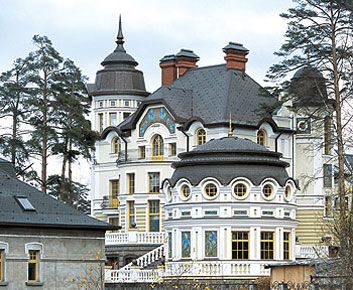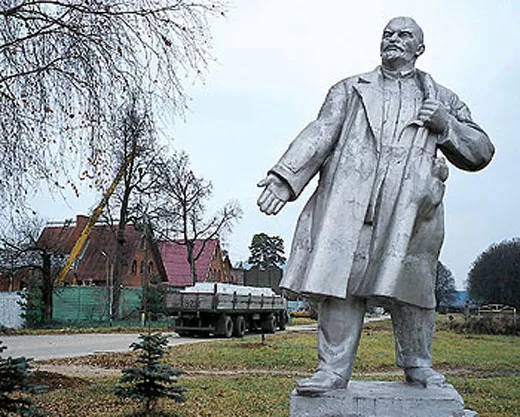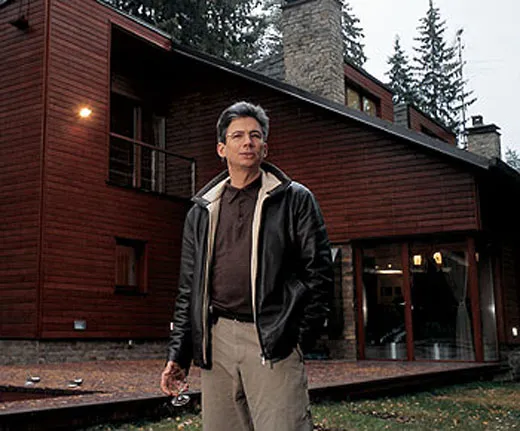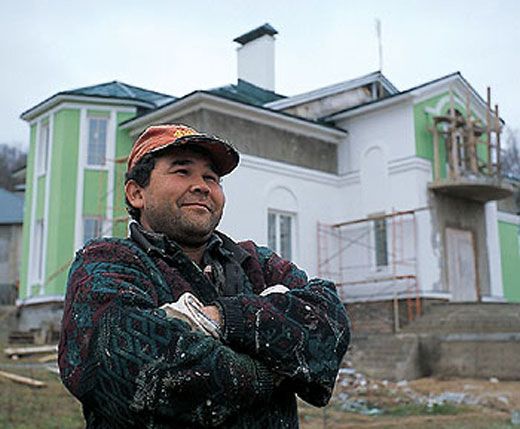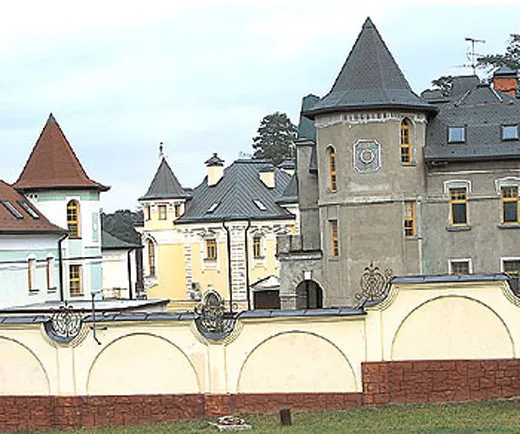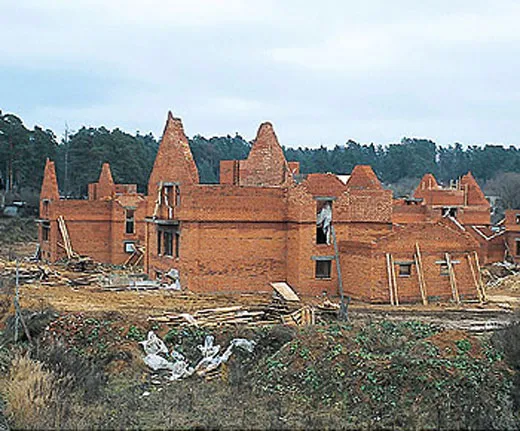Cabin Fever in Russia
As Muscovites get rich on oil, dachas, the rustic country houses that nourish the Russian soul, get gaudy
Turn off the Rublyevsky highway 12 miles west of Moscow, negotiate two unmarked lanes, say the right name at the unmarked gate and a guard with a Kalashnikov will wave you expressionlessly through. Eight freshly built houses are nestled among the summer pines, all of them, from the looks of it, as grand as the one owned by my friend Alexander (he asked me not to use his real name)—a ten-room, three-level affair with a sauna in the basement, a heated pool steaming in the backyard, minimalist blob-art in the capacious living room, and jazz tinkling off a state-ofthe- art stereo system.
Dinner on the poolside patio is caviar and sturgeon, barbecued king prawns the size of turkey legs, sparkling wine and cognac. The talk is of skiing at Chamonix, duck hunting in Argentina, the relative merits of top-model Audis versus BMWs and, of course, real estate. Alexander, his wife, Olga, and their dozen guests are architects, developers and brokers in a Moscow market that has risen 40 percent over the past year. They are bent on enjoying the moment.
Welcome to the “Rublyevka,” a ten-mile stretch of road that is coming to symbolize the country grandeur that the wealthiest Russians seem to prize above all else these days, as well as the outlandish consumption that the less fortunate so resent. Drive past billboards for 24-hour sushi delivery and antiques shops and croissant nooks where village markets stood only two years ago, and play the favorite local game of Guess-Whose-Dacha (rhymes with gotcha).
The turreted palaces built next door to each other by Mikhail Khodorkovsky and Platon Lebedev, former major shareholders of oil giant Yukos and now Russia’s best-known prison inmates, are no secret. But the identity of their next occupant is. Some say the yellow stone monstrosity looming out of the trees a few miles away belongs to Pavel Grachev, post-Soviet Russia’s first defense minister. Others reckon the owner is a retired head of the GAI (Gosavtoinspektsia), Russia’s sticky-fingered highway police.
Traffic along the two-lane Rublyevka, where Soviet leaders from Lenin to Yeltsin enjoyed the great outdoors undisturbed by the teeming masses, has grown hellish. Land goes for about $600,000 an acre. No one can be sure, in the chaos of frantic overdevelopment, whether the well they drill for water won’t hit somebody else’s plumbing. But with Russia’s oil-stoked economy growing at 7 percent a year, none of that seems to matter. New neighbors pour in daily to fill up the tracts hawked as “SilverRiver” or “Tall Pines.”
“This is Beverly Hills,” says Olga Kozyreva, manager of the Credit Bank of Moscow’s newly minted Rublyevka branch, which tempts customers with credit cards for children as young as 6. “The best of everything in our country is here.”
Americans reflexively think of $50-a-barrel oil as enriching Arab sheiks. But Russia is the world’s second biggest crude exporter after Saudi Arabia, earning close to $300 million a day at current prices. To those catching the trickles of this fortune, stock markets and even bank accounts are newfangled, dangerous inventions. Fixing up the dacha is something they have gone to with a vengeance.
Millions of urban Soviet families got some sort of country plot from the state, a retreat where they could relax in dense northern woods thick with mushrooms and raspberries in summer and fairy tale snowdrifts in winter. The prime areas west of Moscow, where the MoskvaRiver is still swimmable and prevailing winds blow toward the pollution of the metropolis, were doled out according to rank: Central Committee and Academy of Sciences members on the Rublyevka, generals and Bolshoi Theater performers along the Kiev Highway. All but the grandest dachas were little more than cabins, where water had to be hauled by hand in a bucket and heat came from a wood-burning stove.
No more. Muscovites from all economic strata have scrimped through the post-Soviet period to add gas heat, indoor plumbing and other amenities to their houses. The wealthier among them have torn down the old cabins or consigned them to their nannies and bodyguards while throwing up palaces. “Our people’s taste still tends to the monumental,” observes Gary Onanov, a burly Georgian builder who has put up 150 houses in the west-of-Moscow arc of prosperity. “I try to sell them prefab Scandinavian houses for $150,000. But they want thick stone walls and a garage for five cars.”
As the supply of Soviet-era lots has dwindled, gated communities known as cottage villages have become prized, even though they often sacrifice the traditional dacha’s forested charm. The “Piney Grove” subdivision off the Rublyevka is pitched in a barley field without a tree in sight, its $1.5 million stone mansions virtually peering into each other’s windows from Levittown-size lots. But developers say the villages are all about exclusivity. “Alot of the appeal is living in a unified social layer,” says Sergei Tsyvin, sales director at Moscow’s Inkom Real Estate. “Aperson can feel at peace knowing there’s no one around either looking up or looking down at him.”
Most of the labor for Moscow’s dacha renaissance comes from outside Russia, as itinerants from all corners of the ex- USSR hope to earn enough from the summer building season to scrape through a winter of unemployment back home. Hammers start singing at sunup as the shadow labor brigades tumble out of makeshift quarters in their employer’s shed or on a back porch, simultaneously saving money and dodging any police who might ask for working papers. Dacha owners, for their part, make a parlor sport out of debating the work habits of various nationalities. “I had these two Moldovans here who turned out to be a teacher and a biologist, so naturally they couldn’t do a thing with their hands,” says Elena Smirnova (not her real name), who sold her Moscow apartment last year and sank the funds into rebuilding her family dacha off the Kiev road. “Then I found a Tajik who was golden. Mind you, though, some Tajiks will just lean on their shovels and stare into space.”
Yet those tempted to see the stereotypical mix of oligarchs, bandits and corrupt bureaucrats piggishly flaunting their illgotten gains ought to look again. Those at the unsavory apex of the ex-Soviet pyramid built their country manors back in the wild 1990s. Newer money, like Alexander and Olga’s, comes from entrepreneurs and other professionals who have driven Moscow’s astonishing transformation over the past decade from a desolate central-planning barracks to a vibrant 24-hour European capital with world-class amenities and style. “The person who is earning a lot of money today is an interesting and intelligent person,” says Gary Onanov. “It’s a restaurant owner who started out not long ago with a shish kebab stand.”
And hot on their heels is a bona fide middle class. The average price for a house in a cottage village has already dropped to $500,000, broker Tsyvin says, as “people realize that [7,500 square feet] is really a bit large for a family of four or five.” The figure will fall further, he predicts, as builders turn to pent-up demand for “economy class” homes starting around $200,000.
How many Muscovites can afford a country retreat at that price in a nation without mortgage financing? Statistics are unreliable with declared income still a novelty, but brokers say the number is surely in the hundreds of thousands.
All the same, only at their peril do the dacha elite forget that they take their ease atop a volcano known as Russia in its still-wrenching transition out of communism. Beyond the lights of Moscow, many families do live on the official per capita income of $200 a month and are inclined to see even a mini-fortune of $200,000 as having been stolen from their common socialist pot during the rigged bidding of early capitalism. No one on the Rublyevka expects that rage to erupt in a new 1917. But almost everyone knows it is out there.
“People stick to the Rublyevka and other luxury districts not only for prestige but for safety,” says Gary Onanov. “You could buy all the land you want [60 miles] from Moscow. But then when you go to work one day, the neighbors will come and burn your lovely dacha down.”
